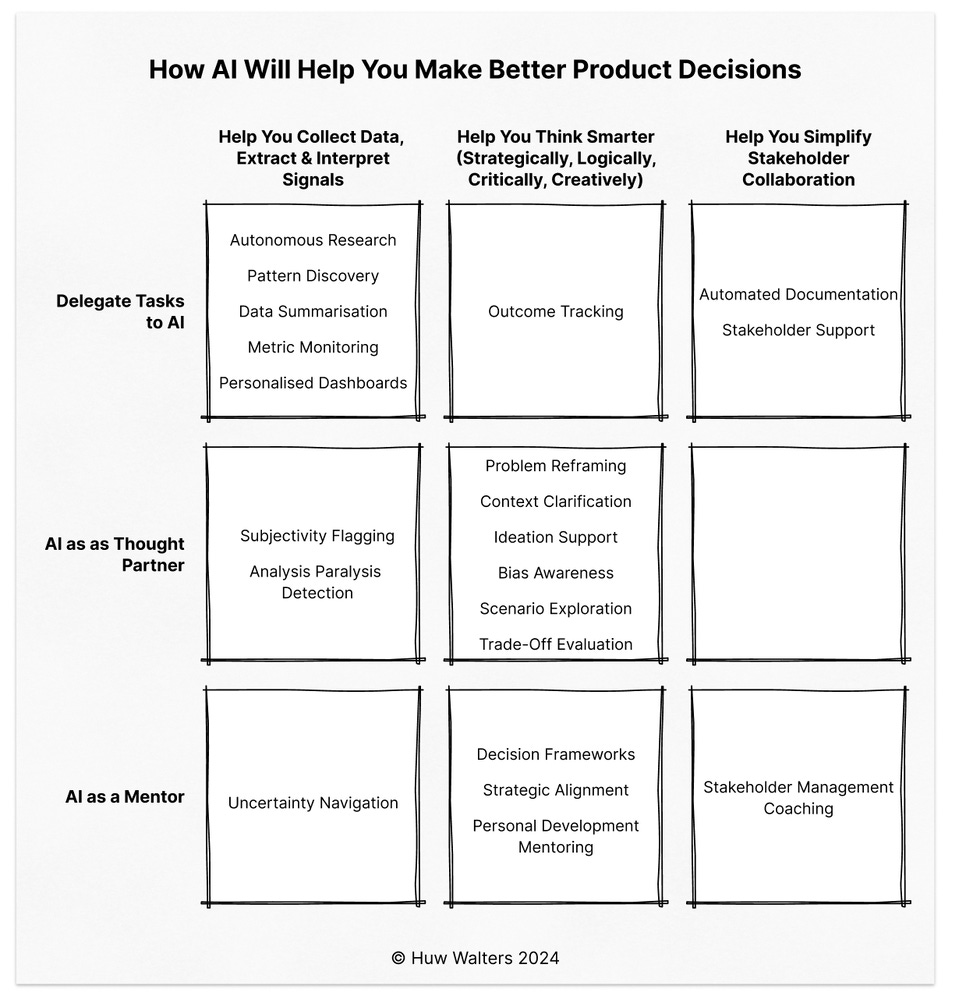Why You’re Worse at Making Decisions Than You Think – and How AI Can Help
For centuries, economists assumed humans were rational actors – making logical choices to maximise benefits while minimising costs. However, in the latter half of the 20th century, as real-world behaviour was scrutinised more closely, it became clear that this rational model didn't capture the complexities of human nature. Behavioural economics emerged to challenge these assumptions, revealing the psychological biases and flawed thinking that often shape our actions.
While many businesses acknowledge that their customers don’t always act rationally, they often fail to apply the same critical thinking to their own decision making.
Why We're All Flawed
The reality is that we, as humans, are not as adept at making decisions as we like to believe. And this is especially true for those of us designing and developing new tech products. We operate in environments filled with high uncertainty – something we are biologically ill-equipped to handle. This is because our brains are wired to favour quick decisions over deliberate, well-considered ones.
Instead of thoughtful analysis, we often rely on intuition and mental shortcuts – heuristics – which can lead to flawed conclusions. We tend to be overconfident, overly influenced by authority figures, and focus on the information that is readily available rather than seeking out contradictory evidence. We also prioritise short-term gains over long-term benefits and frequently misidentify the true problem that needs solving.
How People Try to Solve This
These human flaws are well-known and universal. Yet, in my 15 years in product management, I've seen few companies take more than superficial steps to address them.
It is true that structured decision-making frameworks can help guide people away from common pitfalls, but behaviour change is hard – so when they are adopted, they are often used inconsistently and quickly forgotten.
And, while many teams understand that things like customer feedback, data analysis, and experimentation can reduce subjectivity, they often lack the confidence or skills to plan and implement these strategies effectively.
How AI Will Help
From the extensive R&D I’m doing in my current project, I have a high degree of confidence that artificial intelligence will play a key role in improving decision-making in the future. Here’s a summary of my mental model, specifically tailored to tech product decisions:
1. DELEGATE TASKS TO AI
AI will take on many time-consuming or specialised tasks:
Autonomous Research: AI will independently plan and execute research tasks, sourcing data, analysing it, and delivering actionable insights in response to user questions.
Pattern Discovery: It will mine data to uncover hidden trends, correlations, and outliers that might otherwise go unnoticed, helping teams identify opportunities and risks.
Data Summarisation: AI will condense large volumes of structured and unstructured data – such as metrics and customer feedback – into clear, actionable reports.
Metric Monitoring: It will track key performance indicators in real time, alerting stakeholders when anomalies are detected or when unexpected opportunities arise.
Personalised Dashboards: AI will generate dashboards and visualisations tailored to individual users, highlighting the most relevant metrics and insights.
Automated Documentation: It will document decisions automatically, capturing key details such as rationale, trade-offs, and outcomes in a clear and accessible format.
Stakeholder Support: AI will handle routine stakeholder questions and challenge superficial objections.
Outcome Tracking: It will monitor the results of decisions over time, linking outcomes back to the original rationale and providing feedback loops for continuous improvement.
2. AI AS A THOUGHT PARTNER
It will work collaboratively to enhance decision quality in the moment:
Problem Reframing: AI will challenge team members whether they asking the right questions, proposing alternative ways to frame problems and uncover opportunities.
Context Clarification: It will answer complex or unclear questions, providing deeper understanding and context to help teams move forward with confidence.
Ideation Support: AI will facilitate divergent thinking by suggesting alternative solutions, generating left-field ideas and asking thought-provoking questions.
Subjectivity Flagging: It will highlight when decisions rely too heavily on subjective judgement and suggest ways to incorporate more data-driven approaches.
Analysis Paralysis Detection: AI will identify when teams are overanalysing, highlighting where the cost of further analysis outweighs the benefits.
Bias Awareness: It will identify cognitive biases – such as confirmation bias or availability bias – that could distort decision-making and highlight their impact.
Scenario Exploration: AI will model different scenarios, showing how decisions might play out under varying assumptions, helping teams anticipate potential outcomes.
Trade-Off Evaluation: It will help teams weigh trade-offs systematically, considering both short- and long-term impacts.
3. AI AS A MENTOR
And it will provide high-level direction, opinionated feedback, and support ongoing growth:
Decision Frameworks: AI will recommend and walk users through decision-making frameworks tailored to the context.
Uncertainty Navigation: It will suggest strategies for approaching ambiguous situations, helping teams build confidence when dealing with high uncertainty.
Strategic Alignment: AI will challenge decisions and actions that are misaligned with the overall strategy, ensuring any deviation is well-justified and supports organisational goals.
Stakeholder Management Coaching: It will coach team members on managing challenging stakeholder interactions, including addressing objections and aligning differing priorities.
Personal Development Mentoring: AI will support learning from past decisions by encouraging reflection on the decision process, execution and outcomes.
Conclusion
Human brains are inherently ill-equipped for making decisions in environments filled with uncertainty. Leveraging AI to bridge this gap will provide a competitive advantage for those who adopt it effectively.
🤝 If you’re a Product leader interested in using AI to empower your teams to make better decisions, let’s connect.

